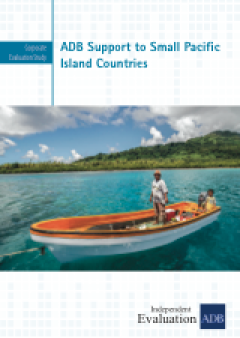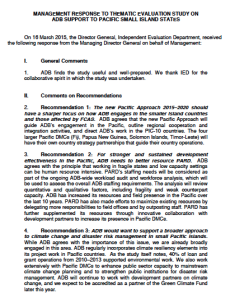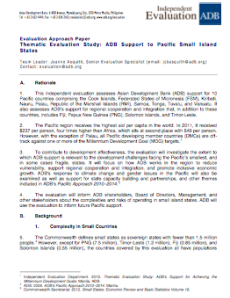
ADB Support to Small Pacific Island Countries
This evaluation assesses the ADB's strategy and development operations in 10 Pacific island countries: Cook Islands, Federated States of Micronesia (FSM), Kiribati, Nauru, Palau, Republic of the Marshall Islands (RMI), Samoa, Tonga, Tuvalu, and Vanuatu (PIC-10). These are among the world's smallest and most remote countries on earth with a combined population of less than one million.
The focus of the evaluation is the relevance of the Pacific Approach for meeting the development needs of the PIC-10, the extent to which it was implemented over the evaluation period and whether it has made a difference to results.
ADB has made notable progress in improving its field presence and increasing its collaboration with other development partners over the evaluation period. The level of engagement between ADB and the PIC-10 has improved and a more collaborative approach is developing with respect to new initiatives because of greater field presence.
ADB recognizes that meeting the needs of fragile and conflict-affected situations (FCAS) countries has financial resource and staffing implications. With limited capacity for project implementation, Pacific small and FCAS countries need more staff per operation than non-FCAS operations.
While ADB is a small development partner in the PIC-10, it is a significant creditor. However, most countries have limited capacity to service debt, and it can quickly become unmanageable. Kiribati, RMI, Nauru, Samoa, and Tuvalu are all assessed at high risk of debt distress, and Tonga at moderate risk. Grants for project financing have therefore become an important part of operational financing in the PIC-10.
ADB has supported the scaling up of activities to promote climate change adaptation and disaster risk reduction at both country and regional levels. While this is a work in progress, there is a reasonably good appreciation among Pacific countries and development partners of the possibilities for adaptation and the measures necessary to adapt to climate and disaster risks.
The Pacific Approach recognizes the challenges of working in the Pacific. It calls for a better understanding of state fragility, and vulnerability, and a different development approach. ADB has made good progress with some aspects of the Pacific Approach agenda. It has built field presence and deepened its collaboration with other Pacific development partners and promoted innovative regional approaches which respond to country demand.


